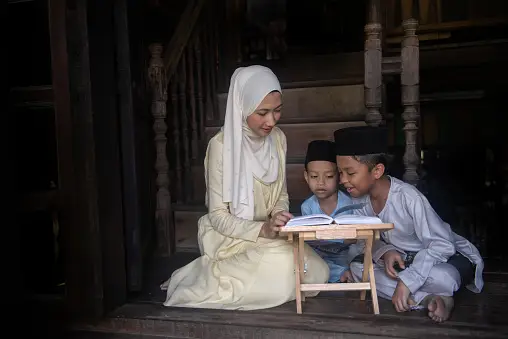
Can Women Become Quran Teachers?
The role of women in Islamic education has been a topic of discussion and debate for many years. One area where this discussion often arises is in the teaching of the Quran. In Islamic tradition, teaching the Quran is considered a noble and virtuous act, and both men and women are encouraged to seek knowledge and educate others. However, there are varying opinions and practices regarding whether women can become Quran teachers, especially in more conservative or traditional communities and in norani qaida online learning.
Historical Perspective
Historically, women have played significant roles in Islamic education, including teaching the Quran. Throughout Islamic history, there have been many female scholars and educators who have made important contributions to the field of Quranic studies. These women were respected for their knowledge and piety and served as role models for future generations of Muslim women.
Quranic Verses and Hadiths
The Quran and the Hadith (sayings and actions of the Prophet Muhammad) contain several references that emphasize the importance of seeking knowledge and teaching others. While these sources do not specifically address the issue of women teaching the Quran, they provide a general framework that supports the idea of women being involved in educational activities.
Islamic Legal Views
In Islamic jurisprudence, there are differing opinions regarding whether women can become Quran teachers. Some scholars argue that women can teach the Quran to other women and children, citing the examples of female companions of the Prophet Muhammad who taught the Quran to other women. Other scholars take a more restrictive view, stating that women should not teach the Quran to men, especially if it involves direct interaction or physical proximity.
Contemporary Practices
In many Muslim-majority countries and communities, women are actively involved in teaching the Quran. Female Quran teachers often teach other women and children in schools, mosques, and private settings. In some cases, women may also teach male students, but this practice varies depending on cultural and religious norms.
Challenges Faced by Female Quran Teachers
Despite the important role that women play in Quranic education, female Quran teachers may face challenges and obstacles. In some communities, there may be social or cultural barriers that discourage women from pursuing careers in education. Additionally, female teachers may face discrimination or lack of support in male-dominated educational institutions.
The Role of Female Quran Teachers
Female Quran teachers play a vital role in preserving and passing on the teachings of the Quran to future generations. They not only impart knowledge of the Quran but also serve as mentors and role models for their students. Female Quran teachers can provide a nurturing and supportive learning environment, especially for female students who may feel more comfortable learning from a woman.
The Importance of Female Quran Teachers
Female Quran teachers play a crucial role in Islamic education for several reasons:
1. Providing Female Role Models
Female Quran teachers serve as important role models for other women and girls in the community. They demonstrate that women can be knowledgeable about the Quran and can have successful careers in Islamic education.
2. Ensuring Proper Education for Women
In many conservative communities, women may face restrictions on attending mixed-gender classes or studying with male teachers. Female Quran teachers provide a way for women to receive a proper Quranic education while respecting these cultural norms.
3. Meeting the Educational Needs of Women
Women may have specific educational needs that are best addressed by female teachers. Female Quran teachers can provide a supportive and understanding environment for female students, especially on topics that may be sensitive or personal.
4. Preserving Islamic Tradition
By becoming Quran teachers, women help preserve Islamic tradition and ensure that the teachings of the Quran are passed down accurately to future generations. Their knowledge and expertise contribute to the overall preservation of Islamic knowledge.
5. Enhancing Community Understanding
Female Quran teachers can help enhance the community’s understanding of Islam by providing a female perspective on Quranic teachings. This can lead to a more inclusive and diverse interpretation of Islamic principles.
Challenges and Opportunities
While there are many opportunities for women to become Quran teachers, there are also challenges that they may face:
1. Cultural and Social Barriers
In some communities, there may be cultural or social barriers that discourage women from pursuing careers in Quranic education. These barriers can include stereotypes about women’s roles and limited access to educational opportunities.
2. Lack of Support
Female Quran teachers may also face a lack of support or resources, especially in male-dominated educational institutions. They may have fewer opportunities for professional development and career advancement compared to their male counterparts.
3. Balancing Family and Career
Like women in other professions, female Quran teachers often have to balance their career with family responsibilities. This can be challenging, especially if they are expected to fulfill traditional gender roles in addition to their teaching duties.
4. Advocating for Change
Despite these challenges, many women are advocating for change in their communities to promote greater gender equality in Quranic education. They are working to overcome cultural and social barriers and to create more opportunities for women to become Quran teachers.
In conclusion, women can and do become Quran teachers, playing a vital role in Islamic education. Female Quran teachers provide important educational opportunities for women, serve as role models and mentors, and help preserve Islamic tradition. While there are challenges that women may face in pursuing a career in Quranic education, there are also many opportunities for them to make meaningful contributions to their communities and to the wider Muslim world.
Conclusion
In conclusion, women can and do become Quran teachers, playing a crucial role in Islamic education. While there may be differing opinions and practices regarding the extent of their teaching responsibilities, there is a strong tradition of female involvement in Quranic education. Female Quran teachers continue to make valuable contributions to the Muslim community, helping to preserve and transmit the teachings of the Quran to future generations.
Leave Your Comment